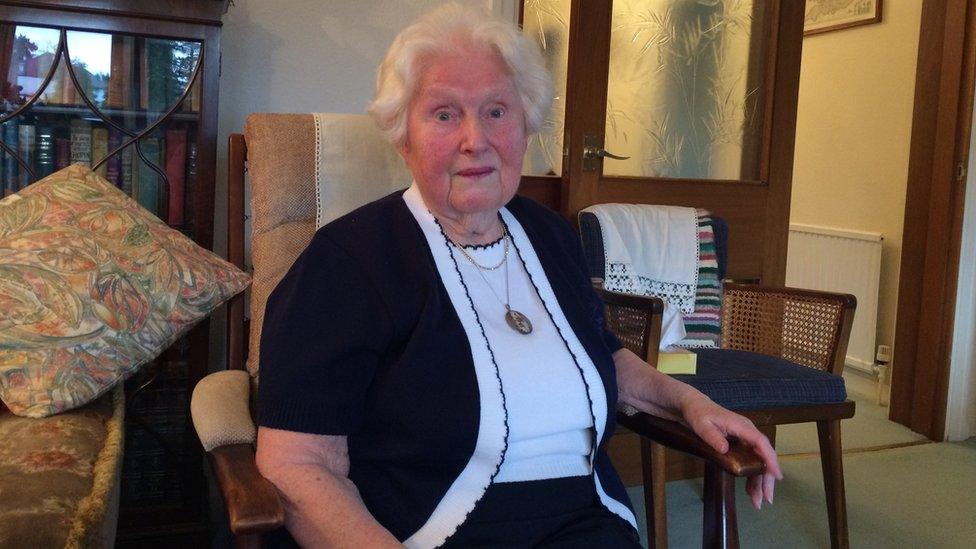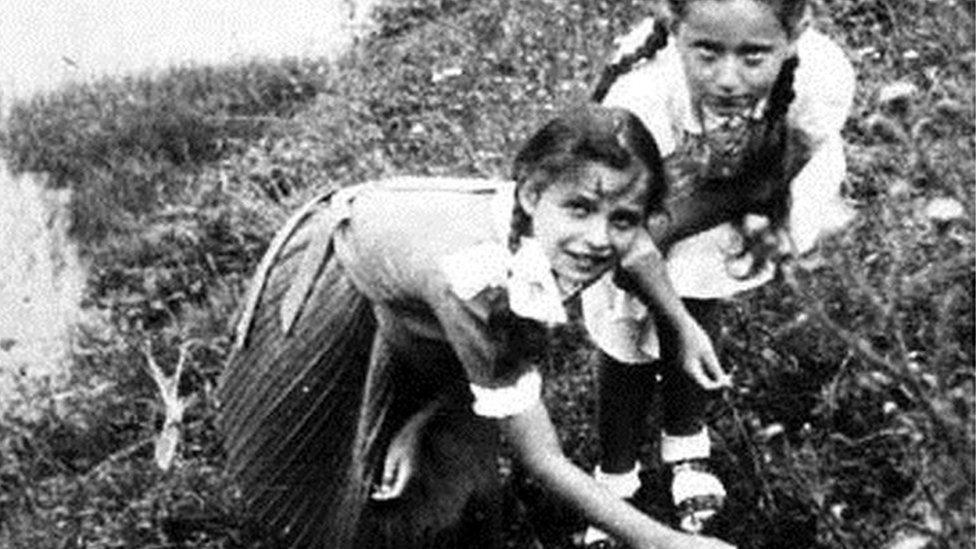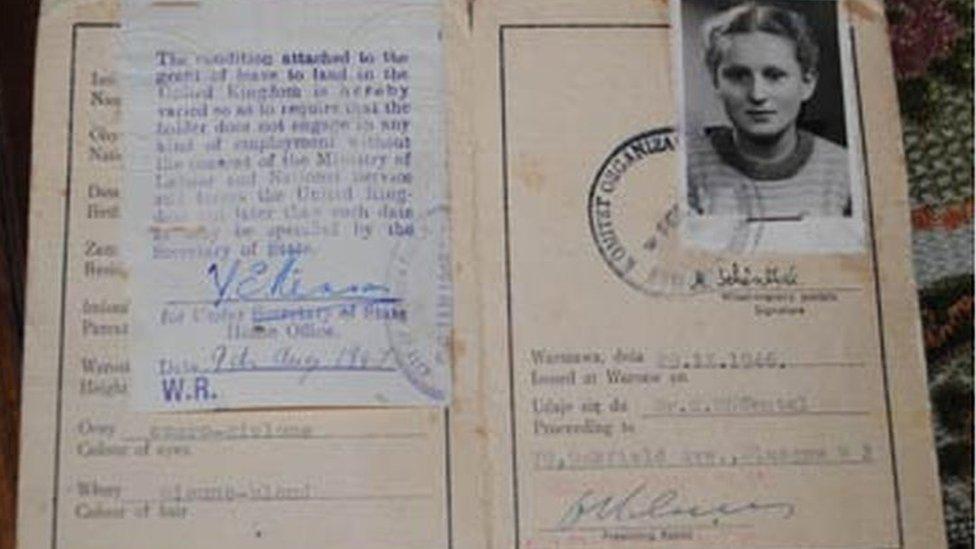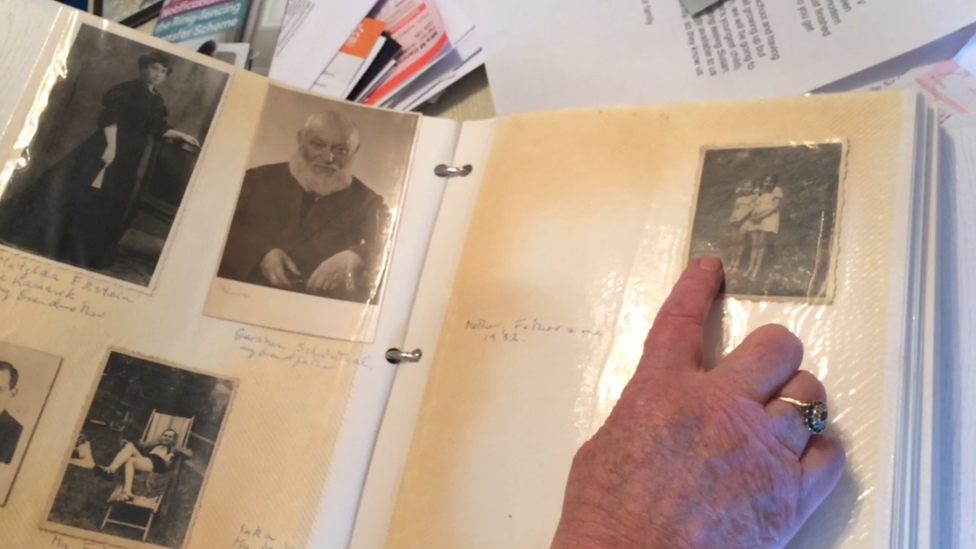'Scotland has really been very good to me'
- Published

Marion Camass came to Scotland when she was 14 after fleeing Krakow during the war
As a child, Marion Camrass undertook an epic journey from Poland to Siberia and then Uzbekistan, as World War Two raged around her, before she finally made it to Glasgow.
The 85-year-old will be spending Holocaust Memorial Day like every day, with her own thoughts of family lost at that time, but also the new family and life she has built in Scotland.
Her story begins in Krakow in 1932 where she was born into a well-to-do family. As an only child and grandchild she admits to being "rather spoiled".
But their comfortable life changed on the outbreak of war, when she was just seven.
The family had been on holiday and never returned home, instead fleeing east ahead of the German army.
"German planes were coming low over and shooting at us," Marion recalls.

Marion (on right) with a friend in Bukhara in Uzbekistan
The family would jump off the horse and cart in which they were travelling to hide in the forest.
Eventually they reached a town in what is now Ukraine where they lived in a rented room.
They refused Soviet passports and shortly afterwards the Russians took them and other Poles, put them on cattle trucks and sent them on a rail journey of 10 days or more.
They ended up in Siberia in a camp which had housed political prisoners.
Infested with bed bugs, four families were housed in a one room, so each got just a corner.
Friends and allies
Marion says: "We somehow managed to survive, although when winter came it really got very hard because when the snow started it just forgot to stop."
The snow reached the roof of the barracks and each day the men had to dig themselves out of the front door.
Again, events far away from them directly affected the family.

Marion's passport from 1946 when she arrived in the UK aged 14
In the summer of 1941 Nazi Germany invaded the Soviet Union and the Camrass family, along with many others, went from being enemy aliens to friends and allies.
That meant they were allowed to leave Siberia.
Initially, the Camrass family stayed put, thinking they might be safer where they were, believing Hitler would not make it to somewhere so remote.
But the prospect of another freezing winter had them on the move again.
Nothing to eat
The men lashed together timber to make a huge raft and a group floated 200km (124 miles) down a river to the railway station.
"Talk about being hungry, we had literally nothing to eat," Marion says.
With the German army moving into Russia the family headed for the Central Asian republics, again in a cattle truck. The last stop was Bukhara in Uzbekistan and so they got off.
Marion remembers the weather being "lovely" - such a contrast to Siberia.
But tragedy was to follow.
Her father contracted typhus and died. Her mother survived the illness but was still very unwell.
"She had to put me in an orphanage because she simply couldn't feed me," Marion says.
Murdered by the Nazis
In 1946, after the end of the war, Marion and her mother returned to Poland.
She says: "When we returned, unfortunately we found that everybody had been murdered by the Nazis."
"My grandparents, aunts, uncles, cousins, numerous family - all gone and all the property that we had, had been confiscated by the Communist government.
"We had nobody and nothing. It was a very sad time."

Marion remembers the family she lost during the war
Things remained difficult in Poland and Marion was sent to Scotland to live with an aunt in Glasgow.
"The most strange thing I found here was all these chimneys on the roof because in Poland you have one big chimney," she says.
"I didn't realise they all came from separate fireplaces and I stood at the window and looked and thought what on earth is that."
She was sent to school right away where her first task was to learn English.
Marion began studying medicine but soon met her future husband - a doctor.
"I've got three wonderful children and eight wonderful grandchildren, so I've been very, very fortunate," she says. "Scotland has really been very good to me."
Skin deep
What are her thoughts today on Holocaust Memorial Day?
"I remember every day my grandparents and my father and all the aunts and uncles and everybody.
"I don't need reminding but I will go to Garnethill synagogue for the prayers.
"Unfortunately the Holocaust was something that nobody could ever have imagined, but if we had stayed in Krakow, if we had not run away, we probably wouldn't be here at all.
"It is important that people should know - civilisation is only skin deep."
You can read more about Marion Camrass' story on the Gathering the Voices website. , external